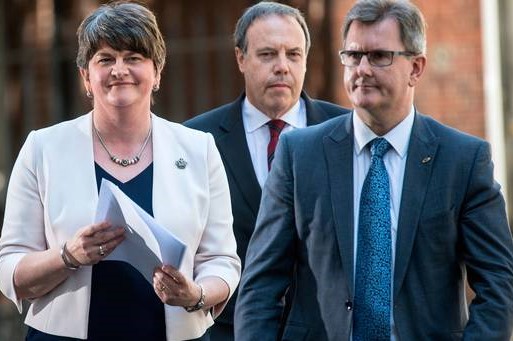AFP photo
By
Rupen Savoulian
British Prime Minister Theresa May has finalised a deal with the Northern Irish Democratic Unionist Party to prop up her minority Tory government. This arrangement, made in the wake of the surprising and encouraging surge of electoral support for the leftist Labour candidate Jeremy Corbyn, has focused public attention on the nature of the Theresa May’s new friends. Indeed, the link between the English ruling elite and the DUP are extensive and run deep.
Corbyn overcame an inner-Labour party conflict, a hostile media campaign, and initially poor opinion polls predicting a Tory landslide. He won over enough of the electorate on an anti-austerity manifesto, and achieved the largest vote swing to Labour since the 1945 election of Clement Attlee.
However, this result should not blind us to the emergent danger in our midst – the political alliance between the Conservative Party and the DUP. In an article published in Jacobin magazine, authors Kerby Miller and Connor Lewis examine the nature and political platform of the DUP. In their article, entitled ‘May’s Monsters’, they reveal deeply sectarian, ultra-right wing and bigoted politics of the DUP and its base of support. Not only does it advocate an exclusively Protestant state for Protestant people to the exclusion of all others, it has extensive links with Loyalist paramilitary terrorist death squads.
Using the label ‘monsters’ to describe the nature of the DUP is not an exercise in wilfully slanderous intent, nor does it minimise the toxicity of their brand of ultra-right wing Protestant fundamentalism. It is meant as a description of the poisonous effect they will have on British politics. As Miller and Lewis explain in their article:
Founded by conservative zealot Reverend Ian Paisley, the DUP most closely resembles the racist blood-and-soil fascism of the British National Party and the European far right. Paisley first came to prominence by crusading against the faintest whiffs of ecumenism from Canterbury or Rome in the 1950s. Over the next twenty years, he emerged as a hardline opponent of the Northern Irish Civil Rights Association as well as the power-sharing agreements aimed at restoring peace in the North.
The DUP are a party of racist, homophobic and creationist bigots who will turn the clock back in the UK on a range of social and political issues. The DUP oppose reproductive rights for women, are against marriage equality for same-sex couples, and intend to impose a biblically literalist interpretation of education in schools. It is not wrong in and of itself to have a debate about abortion, contraception, same-sex marriage equality or religious education in schools. However, it is toxic for a society when a party turns the clock back on social and political issues based exclusively on a strict, literalist interpretation of a holy scripture.
May’s deal with the DUP is a slap in the face for all those who have worked for decades to promote science education in schools, who have fought and campaigned for LGBTI and reproductive rights in Britain, and who are facing discrimination on the basis of their gender identity or sexual orientation. The DUP will return the public to stone age times, so to speak. Campaigners and groups across Britain, from the Royal College of Midwives, the Trade Union Council and the British Pregnancy Advisory Service, are calling upon May to stop the reactionary agenda of the DUP.
It is interesting to note that May never actually raised any of the above issues during the election campaign. She had ample opportunity to put these questions to the electorate. However, in the wake of the poor showing of the Tory party in the election, she immediately approached the DUP for an electoral alliance – a desperate move by a beleaguered politician. In order to hang on to power, however tenuous or fragile her hold on power is, May has openly sided with a party that not only vilifies gays, Muslims, Catholics and Irish nationalists, but is in many ways a Vanilla ISIS.
In an article exposing the ultra-sectarian origins of the DUP in Ulster loyalism, Connor Kelly writes that the DUP is the last refuge of desperate Tories. Kelly writes that the DUP’s electoral appeal proceeds across class lines, drawing voters from working class Protestant communities as well as wealthier middle and upper class constituencies. This cross-class voting is solidified by a sectarian hatred of everything Irish Nationalist, republican and Catholic. Founded by the late Reverend Ian Paisley, an Ulster fundamentalist and bigot, the DUP has consistently operated as a prop for the British state in the north of Ireland.
One of the issues that did arise during the election campaign were the talks that Jeremy Corbyn held with representatives of Sinn Fein, the Irish nationalist party. Corbyn was immediately assailed by the Tory party and associated heavyweight media for being a terrorist sympathiser. That accusation is not only ironic, it is hypocritical in the extreme, given that the DUP, May’s new friends, have longstanding and deep roots in the Ulster loyalist terrorism that has plagued the north of Ireland for decades. Sectarian hatred is not something new or a recent development in the Protestant statelet, sadly. Ulster loyalism was built into the political framework of that statelet since the partition of Ireland in 1922.
Britain has ensured that Unionist control was maintained through the application of gerrymandering electorates, brute force and discrimination. British military intelligence recruited, trained and armed Protestant loyalist groups that went on to become terrorist death squads. The various paramilitary groupings – the Ulster Volunteer Force (UVF), the Ulster Defence Association (UDA) – were all established to provide a strong underpinning for British imperial rule in the north of Ireland. Ulster unionism, organised into the Orange Order, has always been a barrier to Irish nationalism and has bolstered British rule in that country.
Counterfire magazine published an informative article by Chris Bambery, examining the loyalist paramilitary origins of the DUP. Bambery wrote that in the north of Ireland, the Protestant supremacist order was maintained by violence:
It is commonplace to blame the Northern Ireland Troubles that ran from 1968-1969 until the Good Friday Agreement of 1998 on the IRA. Yet Loyalist killings, and those of the security forces, predated the IRA’s military campaign. The 1966 UVF killings were in many ways the start.
While the IRA is usually blamed exclusively for bringing weapons and guns into the Irish-British conflict, political violence is not the single preserve of the Irish nationalists. In fact, politically-motivated violence – sectarian-based, fundamentalist violence – was practiced by the Unionist side since the early days of partition. The DUP, formed in the early 1970s on the basis that traditional Ulster politicians were ‘too soft’ on Irish nationalism, was also following in the footsteps of ultra-violent predecessors. Make no mistake – Loyalist violence was always at least tolerated – and sometimes organised and encouraged – by the British military-state apparatus. Connor Kelly wrote that:
We cannot examine any political support the DUP gave to loyalist death squads without also looking at the direct military and intelligence support that the British State lavished on these groups. Collusion between loyalist groupings and the RUC is, at this point, well known. But British Intelligence (military and otherwise) also aided and abetted – and sometimes organised – atrocities committed by people who have been described by former Police Ombudsman Nuala O’Loan as “serial killers.”
This level of collusion should not be surprising, given that Ulster loyalism has been a significant force in suppressing the civil rights movement of Irish Catholic communities in the 1960s. The DUP is merely the continuation of the ugly, sectarian reaction that has helped maintain British rule in the Protestant supremacist statelet.
We should note in this connection, that the DUP is a strongly pro-Israel, Christian Zionist party. It has been a vociferous supporter of the settler-colonial state in the Middle East, and has maintained links with the Israeli state. The DUP and Zionism have a shared history, being sectarian partitioned states organised against the wishes of the indigenous populations. No less a figure than Sir Ronald Storrs, the first British military governor of Jerusalem, noted the connection between the Zionist project in Palestine and Ulster in Ireland:
Enough [Jews] could return, if not to form a Jewish state … at least to prove that the enterprise was one which blessed him that gave as well as him that took, by forming for England ‘a little loyal Jewish Ulster’ in a sea of potentially hostile Arabism.
Ulster loyalism derives its rationale as a Protestant supremacist statelet by couching their project in terms of fulfilling God’s mission in Ireland, in much the same way that Zionism justifies its settlement project in Palestine as a Biblical ‘return’ to the Holy Land.
The Tory party, the primary political instrument of the English ruling class, is in deep crisis. In a move reeking of desperation, the Prime Minister has turned to the DUP to form a toxic and fragile alliance. The crisis of the Tory party will continue, in as much as this arrangement is doomed to failure. However, the crisis is not just about the Tory party, but the project of neoliberal capitalism. Millions of Britons rejected not just the Tory party, but the entire programme of austerity. Bringing the DUP in to shore up a minority government is at best a temporary fix. The DUP will only aggravate the crisis of neoliberalism. It is high time to break not only with the DUP and the Conservatives, but with the neoliberal experiment of austerity.
Rupen Savoulian
I am an activist, writer, socialist and IT professional. Born to Egyptian-Armenian parents in Sydney, Australia, my interests include social justice, anti-racism, economic equality and human rights.



No Comments Yet!
You can be first to comment this post!